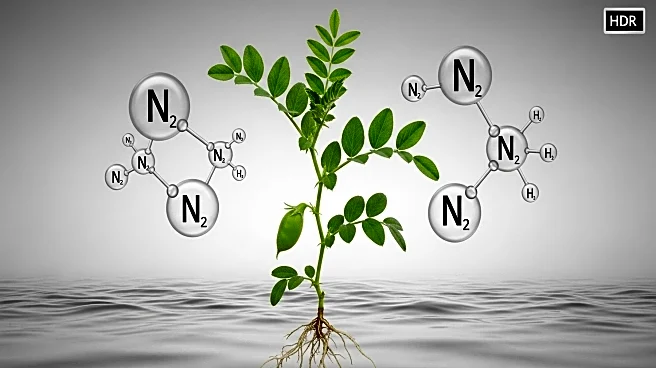What's Happening?
Recent research has focused on the impact of salinity on chickpea plants, particularly how salt stress affects the symbiotic nitrogen fixation process between Rhizobium bacteria and chickpea roots. The study found that salinity reduces the number and weight of nodules, which are crucial for nitrogen fixation. This disruption is due to changes in the cytoskeleton of root hairs, affecting the infection process and nodule development. The research also highlighted the role of antioxidative defense mechanisms in chickpeas, noting that salinity increases reactive oxygen species (ROS) production, which can lead to oxidative stress. However, chickpeas possess a robust antioxidative system that helps mitigate these effects. The study observed that certain chickpea genotypes exhibit better tolerance to salinity, maintaining higher nodulation and antioxidative enzyme activity.
Why It's Important?
Understanding how chickpeas respond to salt stress is vital for improving agricultural practices, especially in regions where soil salinity is a concern. Chickpeas are a significant source of plant-based protein and play a crucial role in sustainable agriculture due to their ability to fix atmospheric nitrogen. Enhancing chickpea resilience to salinity can lead to better crop yields and reduced reliance on synthetic nitrogen fertilizers, promoting environmental sustainability. The findings could inform breeding programs aimed at developing chickpea varieties with improved tolerance to salinity, thereby supporting food security and agricultural productivity.
What's Next?
Future research may focus on identifying and developing chickpea genotypes with enhanced tolerance to salinity. This could involve genetic studies to understand the mechanisms behind antioxidative defense and nitrogen fixation under stress conditions. Additionally, agricultural practices may be adapted to incorporate findings from this research, such as optimizing Rhizobium strains for better nodulation in saline environments. Stakeholders, including farmers and agricultural scientists, may collaborate to implement these strategies, potentially leading to improved chickpea cultivation in affected areas.
Beyond the Headlines
The study underscores the importance of maintaining nitrogen balance in crops under environmental stress, which has broader implications for global food security. As climate change continues to affect soil conditions worldwide, research like this is crucial for developing resilient agricultural systems. The ethical dimension involves ensuring that advancements in crop science are accessible to farmers in developing regions, where salinity may pose a significant threat to food production.










